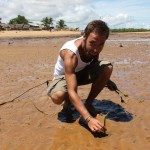About
This multi-disciplinary study examines the changing nature and contexts of human contact with great apes and monkeys in equatorial Africa and the health consequences of that contact. Biomedical researchers have scrutinized the nature of “contact”, but exclusively in terms of hunting and butchering. Social scientists, however, have not investigated this contact, but bring a broad array of methodologies and perspectives to describe the diverse interactions between human beings and nonhuman primates.
This project brings together historical, anthropological, geographic and microbiological analyses to provide a fuller description of how contact, its nature and significance have changed over time and shaped human health. This social sciences study will insert the complexity and variability of human practice and historical, geographical processes into studies of zoonotic transmission and disease emergence. Focusing on selected diseases that have emerged in part through human-nonhuman primate interactions, our study offers robust multi-disciplinary understanding of past dynamics of disease emergence and new insight into present and future ones. We are setting the foundation for a metagenomic study of enterotypes shared by humans and great apes — of paramount interest because these interactions are the ground zero of potential pathogens entering human bodies.
The study is being conducted in Cameroon, Gabon and the Democratic Republic of Congo.
The international team includes researchers from Centre Pasteur du Cameroun, Université Paris-Diderot, Université Rennes 2, CIRMF, Hôpital Saint Louis, and City University of New York.
We are also collaborating with the Center for International Forestry Research (CIFAR) and the Wildlife Conservation Society (WCS).







